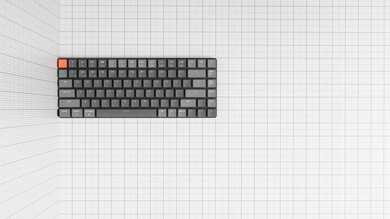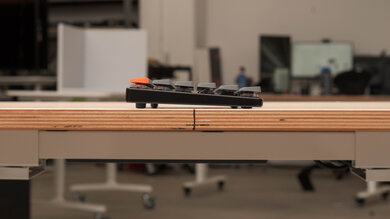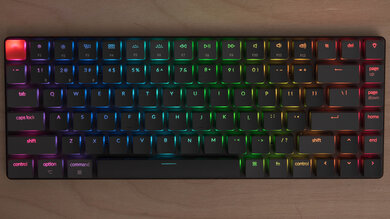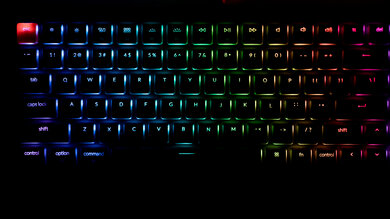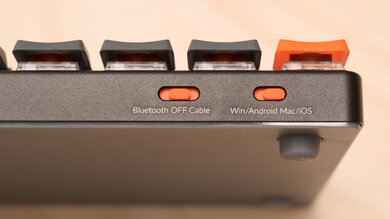The Keychron K3 is a compact 75% keyboard with function and arrow keys, and it's light enough to carry around with you. It works properly with both macOS and Windows because it has an option to switch between modes according to which operating system you're using. It's similar to the Keychron K2 (Version 2) but with low-profile switches. It's available with Gateron Low Profile or Keychron Low Profile Optical switches, and you can choose from a variety of switch types. It has full RGB backlighting, but sadly, it doesn't have dedicated software to remap any keys. Keychron suggests using third-party software, but we don't test for that. The typing quality with the Gateron Low Profile Brown switches we tested is good. Note that it may be difficult to find it at retailers, and it's best to purchase this keyboard directly from Keychron's website.
Our Verdict
The Keychron K3 is great for gaming. The Gateron Low Profile Brown switches we tested are light to press and have a short pre-travel distance. It has full RGB backlighting, but there's no dedicated software to reprogram any keys or set macros. It also doesn't offer much in terms of ergonomics, but with its low profile, you shouldn't get tired using it for long gaming sessions.
-
Full RGB backlighting.
-
Low pre-travel distance.
-
No dedicated software to remap keys.
-
Doesn't come with a wrist rest.
The Keychron K3 is amazing for use with mobile devices. It's very light to carry around, and its compact size makes it easy to place in a bag. It has great build quality, and you shouldn't worry about damaging it while on-the-go. It can connect with up to three devices at once and works with most common operating systems; only a few function keys don't work on mobile devices.
-
Lightweight and compact design.
-
Great build quality.
-
Multi-device pairing.
-
Some function keys don't work on mobile devices.
The Keychron K3 is good for office use. It offers good typing quality, and the Gateron Low Profile Brown switches on our unit are quiet, but your experience may vary depending on which switch you get. It's well-built and is fully compatible with both macOS and Windows. It has decent ergonomics, but it doesn't have any incline settings or a wrist rest.
-
Great build quality.
-
Good typing quality.
-
Doesn't come with a wrist rest.
The Keychron K3 is good for programming. It has full RGB backlighting and the Gateron Low Profile Brown switches on our unit offer a good typing experience, but you can get it in a variety of switches. It has decent ergonomics, but it lacks a wrist rest. Sadly, it doesn't come with dedicated software to reprogram any keys, so you can't set any macros.
-
Full RGB backlighting.
-
Good typing quality.
-
No dedicated software to remap keys.
-
Doesn't come with a wrist rest.
The Keychron K3 is okay for use with a home theater PC. You can connect it wirelessly via Bluetooth, and it has full RGB backlighting, making it easier to use it while watching a movie or gaming in the dark. That said, it lacks a trackpad, which means you need a dedicated mouse to navigate the user interface.
-
Full RGB backlighting.
-
Connects wirelessly.
-
No trackpad.
- 8.0 Gaming
- 8.8 Mobile/Tablet
- 7.6 Office
- 7.6 Programming
- 6.7 Entertainment / HTPC
Changelog
- Updated Nov 16, 2023: We've added a link to the newly-reviewed NuPhy Air75 V2 in theLatency section of this review.
- Updated Mar 05, 2021: Converted to Test Bench 1.0.
- Updated Jan 12, 2021: Fixed an error regarding hot-swappable switches and PBT keycaps.
- Updated Jan 07, 2021: Review published.
- Updated Jan 05, 2021: Early access published.
Differences Between Sizes And Variants
We tested the Keychron K3 Low Profile Mechanical keyboard with Gateron Brown switches and RGB backlighting. It's also available with white backlighting and you can also get it with Gateron Low Profile Blue and Red switches. There's another variant with Keychron Optical switches, which has hot-swappable switches, so you can easily replace your switches without any soldering. Your typing experience and typing noise may change depending on which switches you get.
Keychron sells extra accessories for this keyboard. You can get a wrist rest and a set of premium ABS keycaps directly from their website, so your experience may vary with these extra parts.
| Model | Backlighting | Switches | Switch Type | Hot Swappable |
|---|---|---|---|---|
| Low Profile Gateron Mechanical | RGB | Gateron Low Profile | Red, Blue, Brown | No |
| Low Profile Gateron Mechanical | White | Gateron Low Profile | Red, Blue, Brown | No |
| Low Profile Keychron Optical | RGB | Keychron Low Profile Optical | Red, Brown, Blue, White, Black, Orange | Yes |
| Low Profile Keychron Optical | White | Keychron Low Profile Optical | Red, Brown, Blue, White, Black, Orange | Yes |
If someone notices that their unit doesn't correspond to our review, please let us know in the discussions, and we'll update the review. You can see the label for our unit here.
Compared To Other Keyboards
The Keychron K3 is a good office keyboard and it's very similar to the Keychron K2 (Version 2), except it has low profile switches instead of regular-sized mechanical ones. Its multi-device pairing feature is a nice addition and it's compatible with most devices. However, gamers may be disappointed with the lack of macro-programmable keys and may want to look into other options, such as the Ducky One 2 SF or the Obinslab Anne Pro 2. Also see our recommendations for the best wireless keyboards, the best keyboards for Mac, and the best mechanical keyboards.
The Keychron K3 and the Keychron K2 (Version 2) are two very similar keyboards, except the K3 has low profile switches while the K2 has normal-sized ones. The K3 has better ergonomics because its lower profile makes it comfortable to type on even without a wrist rest. It's also available in a wider range of switch types, including optical ones. However, the K2 offers better typing quality and feels better-built.
The Keychron K6 and the Keychron K3 are both very good all-around keyboards with similar features. The main difference is in their designs. The K6 is a compact 65% keyboard with standard keycaps while the K3 is compact 75%, meaning it has a function row, and it has low profile switches. They're each available with clicky, tactile, and linear switches. Typing feels better overall on the K6, but some people may prefer the low profile switches instead. Latency is also lower on the K6.
The Keychron K3 and the NuPhy Air75 are both compact, low-profile mechanical keyboards intended for different uses. The Keychron is better suited for office use, whereas the Nuphy is better for gaming since it has better latency, and every key is macro-programmable. Also, it uses PBT keycaps rather than ABS. On the other hand, the key legends on the Keychron are shine-through, so you'll be about to see your keys in the dark. The NuPhy is hot-swappable, and the Keychron also comes in a hot-swappable variant, so you can change out the stock switches without soldering.
The Keychron K3 and the Logitech MX Mechanical are both low-profile wireless mechanical keyboards. The Keychron comes in a compact form factor and has full RGB lighting, while the Logitech only has wite-only backlighting. That said, the Logitech is a full-size model that has a bit more premium-feeling build quality and flip-out feet that provide an additional typing angle.
The Keychron K3 and the Logitech MX Keys Mini are both low-profile wireless keyboards with multi-device pairing via Bluetooth. If you prefer compact mechanical boards, the Keychron K3 is a better choice since it's available with a variety of Gateron Mechanical and Keychron Optical switches. You can also use it in a wired mode with its cable, while the Logitech only lets you charge the battery with the cable. Also, it has RGB backlighting and some navigation keys that the Logitech lacks. On the other hand, the Logitech is a compact non-mechanical board with scissor switches. It has white backlighting and customization software to remap keys and create profiles. Also, unlike the Keychron, you can use it with a USB receiver, but you need to buy it separately.
The Keychron K3 and the Keychron K7 are very similar wireless keyboards, but the K3 has more keys. The K3 is a 75% board with a dedicated F-row and a Control button on its right side, which the K7 lacks because of its second Fn key. On the other hand, the K7 is a 65% board with two incline settings, unlike the K3. Both boards are available with Gateron Low Profile and Keychron Low Profile Optical switches. The K3's hot-swappable variant is compatible with Keychron Low Profile Optical switches only, while the K7 is also available with Gateron Low Profile switches.
The Keychron K1 and the Keychron K3 are both great gaming keyboards, but the K1 has a TenKeyLess layout whereas the K3 has a compact 75% layout. Otherwise, they have very similar features, although the K3 has a lower latency over Bluetooth. It also has a Caps Lock indicator light, which the K1 lacks. The K3 is available with many different switches, including optical ones, so you have a wider range of options to choose from. Neither keyboards have software to customize the backlighting or set macros.
The Keychron K3 and the Keychron K12 are both compact wireless keyboards, with different switch styles. If you like low-profile switches and prefer having a dedicated F-row and navigation keys, the K3 is a better choice. However, if you prefer standard-shaped switches and want your board to be as compact as possible, you should go with the K12.
The Keychron K3 and the NuPhy Air75 V2 are wireless low-profile keyboards with a 75% form factor. The NuPhy has better overall build quality, higher-quality PBT keycaps, better gaming performance, and a higher maximum polling rate of 1000Hz. The NuPhy also has a hot-swappable PCB, while the Keychron K3 doesn't.
The Keychron K3 and the Keychron K3 (Version 2) are two very similar compact, wireless keyboards. The K3 V2 is the upgraded version of the K3, and its main differences are that it now has two incline settings for better ergonomics, and there's an additional aluminum plate in the board that reduces the amount of flex. On the other hand, the original K3 offers a better typing experience overall as its switches feel snappier and not as dull.
The Ducky One 2 SF and the Keychron K3 are quite different. The Ducky is a wired-only 60% keyboard, while the Keychron is a low-profile wireless keyboard with a 75% layout. The Keychron is more versatile because it can be used with a wider variety of devices or even in a home theater PC setup. Also, it has full compatibility with macOS and Android, whereas the Ducky is only fully compatible with Windows. However, the Keychron doesn't have any macro-programmable keys like the Ducky. The two keyboards are available in a wide variety of switch options. Unfortunately, they both have relatively high latency, so neither of them is ideal for fast-paced gaming.
The ASUS ROG Claymore II is a wireless full-size gaming keyboard, while the Keychron K3 is a wireless 75% board for office use. The ASUS has macro-programmable keys, dedicated macro keys, customizable RGB backlighting, and a USB passthrough. Also, it has much lower latency, and it has a removable numpad that you can place on either side of the board or remove it completely. On the other hand, the Keychron has Bluetooth and can pair with up to three devices at once, and it comes with extra OS-specific keycaps and a switch to change the key bindings to match the OS you're using. The Keychron is available with low-profile Gateron switches, but some people may prefer standard-size switches like the ones found on the ASUS.
The Drop SHIFT and the Keychron K3 are two great gaming keyboards, though they're fairly different. The Drop is a wired-only model that has all the same keys as a full-sized keyboard but in a slightly more compact layout. It feels a lot more solid and durable, and it offers a much better typing experience. It also has better latency, so it should feel more responsive for fast gaming. On the other hand, the Keychron has a 75% compact layout with function and arrow keys but no Numpad. You can use it wired or wirelessly, which makes it a lot more versatile for other types of uses.
The Keychron K3 and the Mountain Everest Max are different types of keyboards. The Keychron is a wireless, mechanical keyboard with low-profile switches, and it's in a compact 75% format. It's designed for office use, so it's limited in gaming features like macro-programmable keys, but it fully works on both macOS and Windows. The Mountain is a modular gaming keyboard, and it comes with a detachable Numpad and media dock, which you can place how you want or simply remove them. It has software to customize its settings and set macros, but it's not available on macOS. The Mountain is also hot-swappable, so you can use whichever switches you want, but there's a variant of the Keychron that's also hot-swappable.
The Keychron K3 is a wireless mechanical board with low-profile switches, while the Redragon Dragonborn K630 RGB is a wired-only model with standard-sized switches. The Keychron is a 75% board with a dedicated function row, home cluster keys, and arrow keys. You can pair it with up to three devices via Bluetooth. It's fully compatible with macOS and Windows, and it comes with extra keys that you can install to match the OS you're working on. On the other hand, the Redragon offers more customizations. It has native software that lets you remap the keys, customize the RGB backlighting, and configure up to three profiles. Also, the Redragon is hot-swappable, but you can only swap out the switches with other Outemu switches.
The Keychron K3 and the Keychron K14 are similar wireless mechanical keyboards. The K3 is a low-profile, compact 75% keyboard available in a range of Gateron low-profile or Keychron low-profile Optical switches. It also has a row of ten function keys which the K14 lacks. On the other hand, the K14 is available in a range of Gateron G Pro or Keychron Mechanical switches. The K14 offers a better typing experience because its keys don't wobble as much, and its ABS keycaps aren't as slippery. However, you may prefer the responsiveness of the low-profile keys on the K3 instead, especially for gaming. Both keyboards also have a hot-swappable version available, so you can install the switches you prefer without soldering.
The Obinslab Anne Pro 2 is better overall than the Keychron K3. The Obinslab has macro-programmable keys and dedicated software, and it offers a better typing experience. It also has multi-device pairing with up to four devices, while the Keychron can only connect with three at a time. On the other hand, the Keychron is bigger, and it has a function row and dedicated arrow keys, which some people may prefer.
The Keychron K3 and the System76 Launch are two different mechanical keyboards, but they're both designed for office and productivity use. The Keychron is a low-profile, wireless keyboard, so it has better ergonomics and supports multi-device pairing with up to three devices using Bluetooth. On the other hand, the System76 is a wired-only keyboard, but you can completely reconfigure the key layout. Also, it has four additional USB ports, meaning it can act as a USB hub, and it has companion software, which the Keychron lacks.
Test Results
The Keychron K3 is a compact 75% keyboard that has function and arrow keys. It's much lighter than the Keychron K2 (Version 2) and shouldn't be too big to carry around. If you're interested in a similar option but without function keys and with high-profile keycaps, check out the Keychron K14.
Update 01/12/2021: We previously said that you can buy extra PBT keycaps on Keychron's website. Even though you can buy an extra set, they're premium ABS and not PBT. The review has been updated.
The Keychron K3 has great build quality. Its frame is aluminum while there's plastic underneath. It flexes a bit when you press down hard on a key, but this shouldn't be much of a problem during normal use. The keys slightly wobble, but it's not too noticeable while typing. The ABS keycaps feel like they can easily develop shine from oil over time. There aren't any loose parts, and the larger keys don't rattle. There are four rubber feet underneath, and the keyboard doesn't slide around on the desk.
The Keychron K3 is a simple, low profile keyboard with decent ergonomics. It doesn't have any incline settings. However, you can remove the top feet and use the stick-on replacement feet instead, which creates a lower incline, but you won't be able to switch between each set of feet easily. It doesn't come with a wrist rest, either, and since it has such a low profile, you may not need it. Still, if you prefer a wrist rest, Keychron sells a wooden one separately. For a more compact low-profile keyboard with incline settings, check out the Keychron K7, or check out the updated version of this board, the Keychron K3 (Version 2), which has two incline settings added.
The Keychron K3 has full RGB backlighting with individually-lit keys. You can cycle through brightness settings and lighting effects using the Fn and function keys. It doesn't get bright enough to make the colors stand out in a well-lit room.
The Keychron K3 comes with a braided USB-C cable that retains kinks from the packaging. You can easily replace it in case it damages. The keyboard connector noticeably wobbles in the port, which is something we noticed with the Keychron K1 as well.
The Keychron K3 can connect with up to three devices at once via Bluetooth, or you can use it wired while charging. The battery is advertised to last up to 34 hours with RGB on, but this isn't something we test for.
The Keychron K3 doesn't have many extra features. There's no proprietary software to reprogram any buttons, and even though Keychron recommends third-party software, this isn't something we test for. There are switches on top to change between the Windows/Android or mac/iOS modes. Note that there's a variant with hot-swappable switches, so you can easily replace and change your switches without any soldering, but ours doesn't have this feature.
Our unit of the Keychron K3 uses Gateron Low Profile Brown switches, which provide a tactile feel. They have a low pre-travel distance and don't require much force to press. You can also get it with clicky Gateron Low Profile Blue or linear Red switches, such as the ones we tested with the Keychron K1. The keyboard is also available with Keychron Low Profile Optical switches, and that variant has hot-swappable switches, so you can easily change them without soldering.
Update 01/12/2021: We previously said that you can buy extra PBT keycaps on Keychron's website. Even though you can buy an extra set, they're premium ABS and not PBT. The review has been updated.
The Gateron Low Profile Brown switches on our unit of the Keychron K3 provide nice tactile feedback and good typing quality, but your typing experience may change depending on which switches you get. The keys wobble a bit, but it isn't very noticeable during normal use. The layout feels cramped, and you may notice an increase in typos if you're not used to it. The right Shift is also smaller than the left Shift, so you may accidentally hit the arrow keys instead. Also, the ABS keycaps feel slippery. Overall, it shouldn't feel tiring typing on it for long periods, and it's an improvement over the Keychron K1.
Some people may not be a fan of the low profile keys, so if you prefer a compact keyboard with standard keys, then look into the ROYAL KLUDGE RK61.
Our unit of the Keychron K3 with the Gateron Low Profile Brown switches is quiet, but your experience may vary depending on which switch you get.
The latency of the Keychron K3 is a bit high, whether you use it wired or via Bluetooth. It should still be okay for regular, everyday use. However, it might disappoint gamers looking for the lowest input lag. If you're interested in a similar wireless, low-profile model but with better gaming performance, check out the NuPhy AIr75 V2.
The Keychron K3 doesn't come with dedicated software to customize the RGB lighting or reprogram keys. However, Keychron recommends using third-party software to remap keys. In the manual, they recommend Karabiner for macOS and SharpKeys for Windows, but we don't test for these programs.
The Keychron K3 is fully compatible with both Windows and macOS, as long as you set the keyboard to the proper mode with the switch on the top side. The F3 and F4 keys don't work on iOS or iPadOS. You should set the OS slider to 'mac/iOS' if you're using it with Linux, but the F3 and F4 hotkeys don't work. If you set the keyboard to the 'Windows' mode on Linux all of the function keys and the F3 and F4 hotkeys don't work.
Comments
Keychron K3: Main Discussion
Let us know why you want us to review the product here, or encourage others to vote for this product.
Update: We’ve updated the 3D scan in the Shape section of this review because the previous scan was off-centered.


